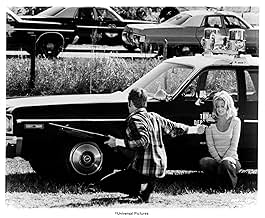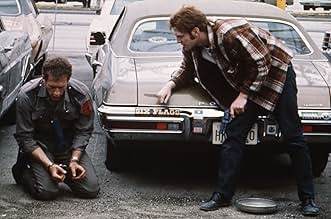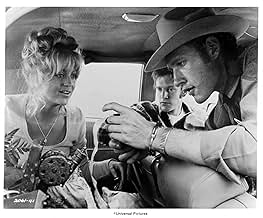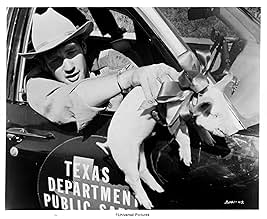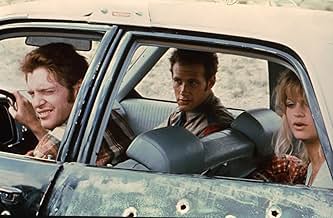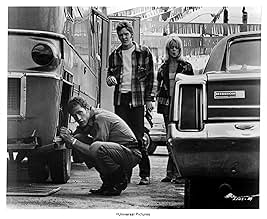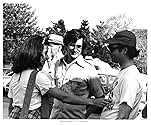Una mujer intenta reunir a su familia ayudando a su marido a escapar de la cárcel y secuestrando juntos a su hijo. Pero las cosas no salen como se planean cuando se ven obligados a tomar com... Leer todoUna mujer intenta reunir a su familia ayudando a su marido a escapar de la cárcel y secuestrando juntos a su hijo. Pero las cosas no salen como se planean cuando se ven obligados a tomar como rehén a un policía en la carretera.Una mujer intenta reunir a su familia ayudando a su marido a escapar de la cárcel y secuestrando juntos a su hijo. Pero las cosas no salen como se planean cuando se ven obligados a tomar como rehén a un policía en la carretera.
- Dirección
- Guionistas
- Elenco
- Premios
- 2 premios ganados y 6 nominaciones en total
- Standby #1
- (as Kenneth Hudgins)
- Buster Daniels - Drunk
- (as Buster Danials)
- Mark Fenno
- (as Jim Harrell)
Opiniones destacadas
If you're interested in Spielberg as a director this is fascinating as it begins to lay out most of the themes that have driven his work ever since - family (especially divided and dysfunctional families), childhood, parenthood, outsiders, America and Americana etc. It's also a really interesting piece in terms of his developing style. This is the first Hollywood film in which panaflex cameras were used allowing Spielberg to produce fantastically elaborate and fluid shots even in the confines of a car (see the superb 360 pan fixed on Ben Johnson's car when he first talks to the Poplins)- a kind of cinematography that has become a hall mark of Spielberg's, as have the rising crane shots and extended tracking shots that pepper the film. Spielberg skies and "God Light" (his term for shafts of light in mist/at night) also feature heavily.
It's also a really interesting if somewhat unrecognised influence on films like Thelma and Louise which seems to lift its basic structure and characters right out of this film. The way Ben Johnson's Captain Tanner equates to Harvey Keitel's police officer in Ridley Scott's film seems particularly close.
Fantastic performances all round too. Johnson, Horne and Atherton (a much under-used actor who has been largely wasted since, playing roles like the self serving journalist in the Die Hard films)particularly shine.
It's also very funny, sad and engaging from beginning to end. Can't recommend this one enough - especially if you're a Spielberg fan.
I also got the impression Spielberg was poking a lot of fun at Texas and Texacans in general, where this takes place. Besides the two idiotic so-called parents, most everyone else is also presented as a buffoon, a country hick with no clue. The more sinister examples are those who live for the opportunity to shoot someone - this is gun country, after all. The only one who escapes with his dignity intact is the police captain, well played by Ben Johnson. There are traces of the imagery and poignancy which many of Spielberg's later pictures would be laced with. There's the absurdity of that long, very long line of police vehicles, lights flashing, following that one car with the fugitives (I guess no other crimes needed attention in the county that day?). And the sudden look on Atherton's face when he watches a Road Runner cartoon is amazing. But these are a few instances far and between in an ambling picture. Hawn is immensely likable, of course, but in the end she comes off as an idiotic screaming shrew who directly causes bad stuff to happen. Maybe it's just me, but I don't really like women such as this. But then, if this is true-to-life, Spielberg captured some sense of an unpleasant reality we have no control over. It just didn't retain such a consistency through the entire movie.
I think what defines this film more than anything is the distinct new Spielberg smell. It has all of the things we recognize from the bigger Spielberg films, just on a much smaller scale. The dialogue flows so naturally and fits right in with the action and camera work of the film. There are lots of familiar camera techniques in the film, especially the fluid camera movement that goes on within the confines of the police vehicle, where a lot of the film takes place. Nothing is as grand and widespread as Spielberg's classics, but anyone who respects the genius can respect this film for what it is because, like it or not, this is where it all began.
But not only is The Sugarland Express a fascinating look into how Spielberg got his start, it is also just an incredibly fun film. Goldie Hawn plays the border line psychopath mother perfectly. She wants nothing more than to see her baby boy again, and she won't let anything stop her. The film hits both ends of the spectrum very nicely. A lot of it is very comedic, ranging from cleverly hilarious to downright goofy at times. Yet there are also moments of sincere dramatic tension. Through all of the offbeat wackiness, the film never forgets the situation it is dealing with. Despite everything, it is still two convicts running from the law, a subject that the characters must handle with care. And the film brings this to light very well, as it is very gripping at moments, and almost touching at others.
The Sugarland Express isn't much more than a very exciting adventure story with some enticing moments of drama thrown in, but you have to love it for that. It doesn't try to be much more and it pulls off everything it wants to deliver with a lot of talented finesse and grace. This is not a film to miss. It's only mistake was coming right before Jaws, a masterpiece that overshadowed it greatly, hence why we know that name, but few of us have heard of the pleasant little gem that is The Sugarland Express.
¿Sabías que…?
- TriviaThis is the first movie to feature a tracking shot (front seat to back) and a 360-degree pan with dialogue from within a car, made possible by the new Panaflex Camera (1972), which was intended to be first used by Clint Eastwood in his directorial debut, Obsesión mortal (1971), but wasn't ready in time.
- ErroresWhile the Border Patrol's purpose is indeed to protect the United States against illegal entry and not vice versa, they are still a law enforcement agency that can be called upon to assist other state or federal agencies (as depicted in the film) to prevent wanted felons fleeing the United States jurisdiction during a pursuit. This has happened numerous times in reality and as such they are completely justified in firing at Clovis's car during their attempted escape.
- Citas
Clovis Poplin: We're in real trouble.
Clovis Poplin: Say, I didn't mean what I said.
Maxwell Slide: What was that?
Clovis Poplin: When I called you a son of a bitch, I didn't mean it
Maxwell Slide: And you ain't no mental subject neither.
- Créditos curiososEpilogue: "Lou Jean served 15 months of a five-year prison term following her parole. She convinced the authorities that she was fit and able to take care of baby Langston. They are now living quietly in a small West Texas town. Captain Tanner and Officer Slide are still serving with the Texas Department of Public Safety."
- ConexionesFeatured in At the Movies: Special Show: The Magic of Spielberg (1984)
- Bandas sonorasThe Eyes of Texas
(uncredited)
Written by John Lang Sinclair
[Played by marching band when the car enters Rodrigues, Texas]
Selecciones populares
- How long is The Sugarland Express?Con tecnología de Alexa
Detalles
- Fecha de lanzamiento
- País de origen
- Idioma
- También se conoce como
- The Sugarland Express
- Locaciones de filmación
- San Antonio, Texas, Estados Unidos(Harlandale ISD Stadium & Military Drive)
- Productoras
- Ver más créditos de la compañía en IMDbPro
Taquilla
- Presupuesto
- USD 3,000,000 (estimado)
- Total en EE. UU. y Canadá
- USD 7,500,000
- Total a nivel mundial
- USD 7,505,037
- Tiempo de ejecución
- 1h 50min(110 min)
- Color
- Relación de aspecto
- 2.39 : 1



